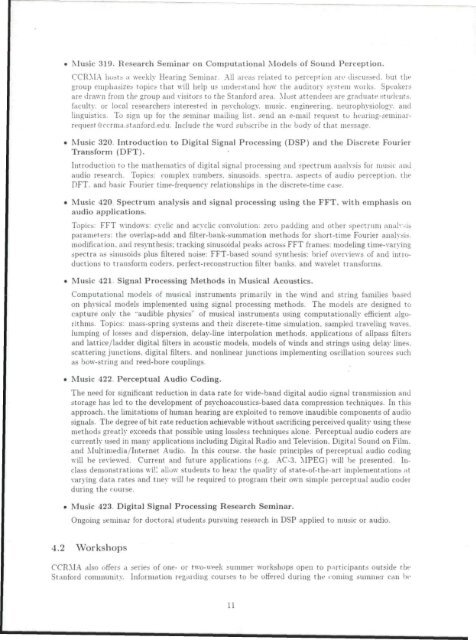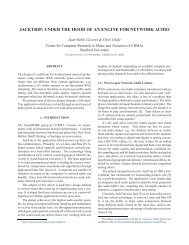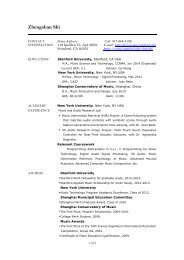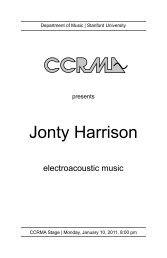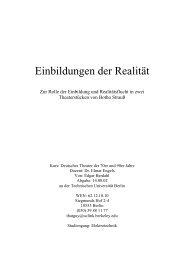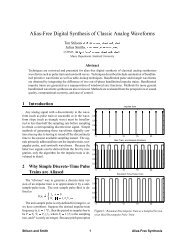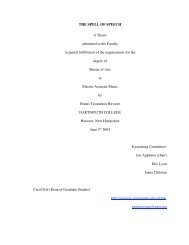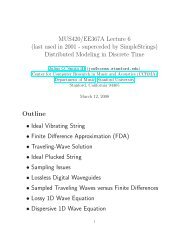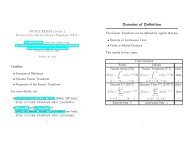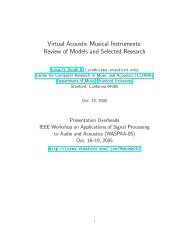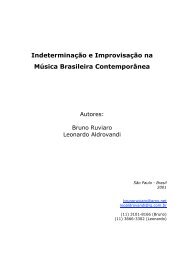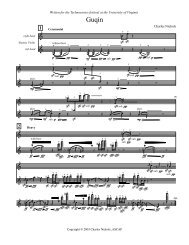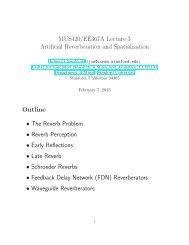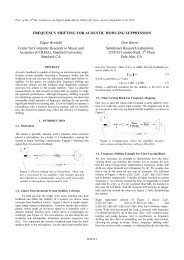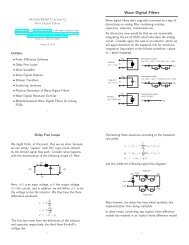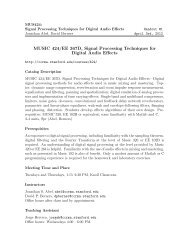Download - CCRMA - Stanford University
Download - CCRMA - Stanford University
Download - CCRMA - Stanford University
You also want an ePaper? Increase the reach of your titles
YUMPU automatically turns print PDFs into web optimized ePapers that Google loves.
• Music 319. Research Seminar on Computational Models of Sound Perception.<br />
<strong>CCRMA</strong> hosts a weekly Hearing Seminar. All areas related to perception nro discussed, but the<br />
group emphasizes topics that will help us understand how the auditory system works. Speakers<br />
are drawn from the group and visitors to the <strong>Stanford</strong> area. Most attendees are graduate students,<br />
faculty, or local researchers interested in psychology, music, engineering, neurophysiology, and<br />
linguistics. To sign up for the seminar mailing list, send an e-mail request to hearing-seminarrequest<br />
9ccrnia.stanford.edu. Include the word subscribe in the body of that message.<br />
• Music 320 Introduction to Digital Signal Processing (DSP) and the Discrete Fourier<br />
Transform (DFT).<br />
Introduction to the mathematics of digital signal processing and spectrum analysis for music and<br />
audio research. Topics: complex numbers, sinusoids, spectra, aspects of audio perception, the<br />
DFT. and basic Fourier time-frequency relationships in the discrete-time case.<br />
• Music 420 Spectrum analysis and signal processing using the FFT. with emphasis on<br />
audio applications.<br />
Topics: FFT windows: cyclic and acyclic convolution: zero padding and other spectrum analysis<br />
paiameters: the overlap-add and filter-bank-summation methods for short-time Fourier analysis,<br />
modification, and resvnthesis; tracking sinusoidal peaks across FFT frames: modeling time-varying<br />
spectra as sinusoids plus filtered noise: FFT-based sound synthesis: brief overviews of and introductions<br />
to transform coders, perfect-reconstruction filter banks, and wavelet transforms.<br />
• Music 421 Signal Processing Methods in Musical Acoustics.<br />
Computational models of musical instruments primarily in the wind and string families based<br />
on physical models implemented using signal processing methods. The models are designed to<br />
capture only the "audible physics" of musical instruments using computationally efficient algorithms.<br />
Topics: mass-spring systems and their discrete-time simulation, sampled traveling waves,<br />
lumping of losses and dispersion, delay-line interpolation methods, applications of allpass filters<br />
and lattice/ladder digital filters in acoustic models, models of winds and strings using delay lines,<br />
scattering junctions, digital filters, and nonlinear junctions implementing oscillation sources such<br />
as bow-string and reed-bore couplings.<br />
• Music 422. Perceptual Audio Coding.<br />
The need for significant reduction in data rate for wide-band digital audio signal transmission and<br />
storage has led to the development of psychoacoustics-based data compression techniques. In this<br />
approach, the limitations of human hearing are exploited to remove inaudible components of audio<br />
signals. The degree of bit rate reduction achievable without sacrificing perceived quality using these<br />
methods greatly exceeds that possible using lossless techniques alone. Perceptual audio coders are<br />
currently used in many applications including Digital Radio and Television. Digital Sound on Film,<br />
and Multimedia/Internet Audio. In this course, the basic principles of perceptual audio coding<br />
will be reviewed. Current and future applications (e.g. AC-3. MPEG) will be presented. Inclass<br />
demonstrations wi!! aiiuw students to hear the quality of state-of-the-art implementations at<br />
varying data rates and they will be required to program their own simple perceptual audio coder<br />
during the course.<br />
• Music 423 Digital Signal Processing Research Seminar.<br />
Ongoing seminar for doctoral students pursuing research in DSP applied to music or audio.<br />
4.2 Workshops<br />
<strong>CCRMA</strong> also offers a series of one- or two-week summer workshops open to participants outside the<br />
<strong>Stanford</strong> community. Information regarding courses to be offered during the coming summer can he<br />
11


